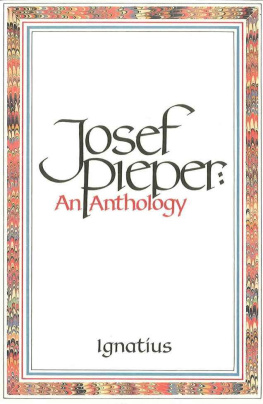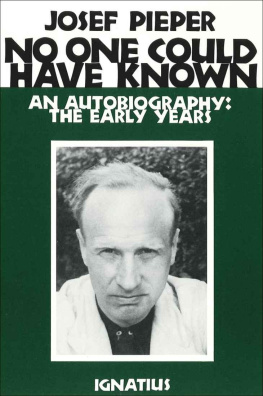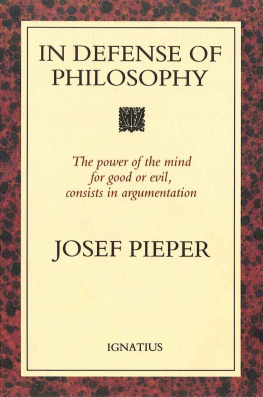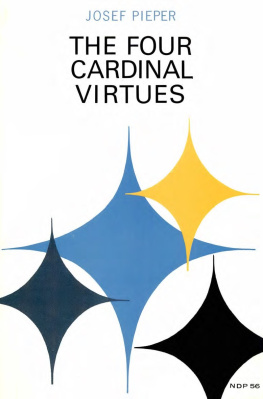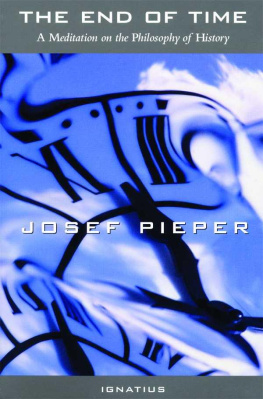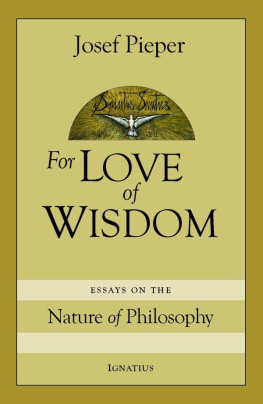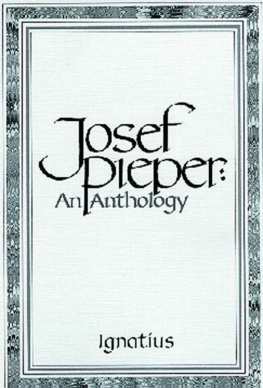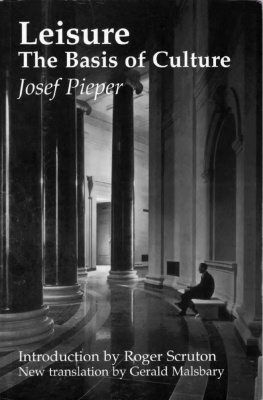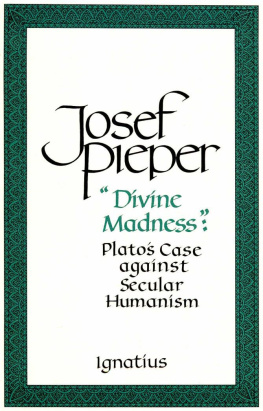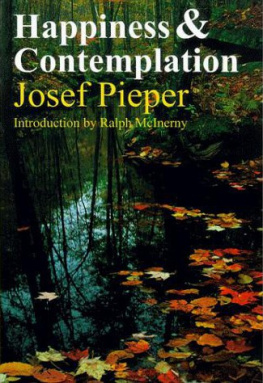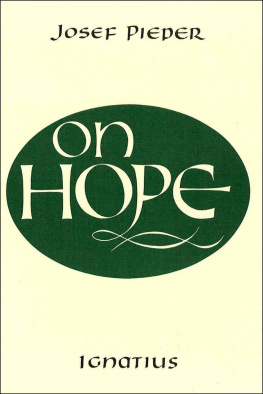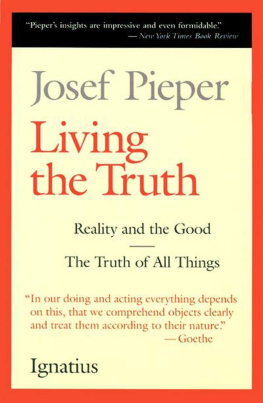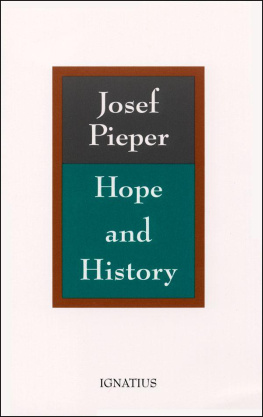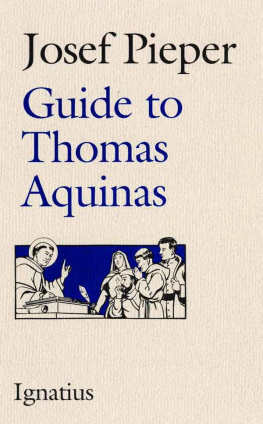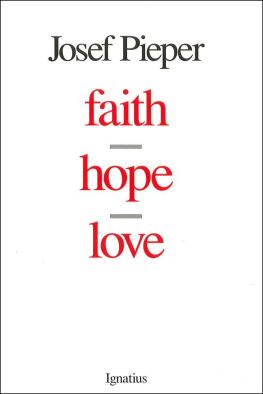Josef Pieper - Josef Pieper: An Anthology
Here you can read online Josef Pieper - Josef Pieper: An Anthology full text of the book (entire story) in english for free. Download pdf and epub, get meaning, cover and reviews about this ebook. year: 0, genre: Science. Description of the work, (preface) as well as reviews are available. Best literature library LitArk.com created for fans of good reading and offers a wide selection of genres:
Romance novel
Science fiction
Adventure
Detective
Science
History
Home and family
Prose
Art
Politics
Computer
Non-fiction
Religion
Business
Children
Humor
Choose a favorite category and find really read worthwhile books. Enjoy immersion in the world of imagination, feel the emotions of the characters or learn something new for yourself, make an fascinating discovery.
- Book:Josef Pieper: An Anthology
- Author:
- Genre:
- Year:0
- Rating:4 / 5
- Favourites:Add to favourites
- Your mark:
- 80
- 1
- 2
- 3
- 4
- 5
Josef Pieper: An Anthology: summary, description and annotation
We offer to read an annotation, description, summary or preface (depends on what the author of the book "Josef Pieper: An Anthology" wrote himself). If you haven't found the necessary information about the book — write in the comments, we will try to find it.
Josef Pieper: An Anthology — read online for free the complete book (whole text) full work
Below is the text of the book, divided by pages. System saving the place of the last page read, allows you to conveniently read the book "Josef Pieper: An Anthology" online for free, without having to search again every time where you left off. Put a bookmark, and you can go to the page where you finished reading at any time.
Font size:
Interval:
Bookmark:
JOSEF PIEPER
An Anthology
An Anthology
Foreword by
Hans Urs von Balthasar
IGNATIUS PRESS SAN FRANCISCO
Title of the German original:
Josef Pieper: Lesebuch
1981 by Ksel-Verlag GmbH & Co., Munich
Second edition 1984 by Ksel-Verlag GmbH & Co., Munich
Cover by Victoria Hoke Lane
1989 Ignatius Press, San Francisco
All rights reserved
ISBN 978-0-89870-226-2
Library of Congress catalogue number 88-83748
Printed in the United States of America
The Two Sides of the Coin
That Is Truth
The Freedom of Philosophy
and Its Adversaries
Free Space in
the World of Work
In each of his thick little books Josef Pieper is so present to us both as a thinker and a man and reveals himself so openly that it would hardly make sense to write a book about him. I was particularly captivated by his wonderful afterword to the German edition of C. S. Lewis work The Problem of Pain , which bears the title Concerning Plainness of Language in Philosophy. Here he shows that the specialized sciences, which are always abstracting from the meaning of Being as a whole, must develop a precise language and must, indeed, be satisfied with that . But the philosopher, who in Goethes words contemplates the holy and manifest mystery of Being and its meaning, does best to keep to that language which always grows out of the wisdom of man as he philosophizes unconsciously. A word from the treasury of home-grown human language contains more reality than a technical term. And then follows this astounding but accurate statement: Improbable as this may sound, we can say that not only Lao Tzu, Plato and Augustine but even Aristotle and Thomas Aquinas used no technical terminology. Just these names are a guarantee of the fact that what Pieper means by plainnesswhich for him is the very seal of credibilityin no way implies something flat or even trivial and therefore easy to understand.
Why not? Because the method of each science is the correct one when that science allows itself to be determined and molded by its object. History and psychology are exact in a manner different from the exactness of physics or biology. The following fundamental principle has always remained Piepers point of departure: to accept the given as it gives itself, and to allow it its existence as such, in its own truth, goodness and beauty, is the precondition for learning anything about it. And when we come to consider man, it is this same principle that enables us to tell when and how man appears in all the precise truth and excellent strength ( virtus ) proper only to himself. The cardinal virtues as a whole, as interpreted anew by Pieper in the light of Plato and Thomas in his four famous little books, are nothing but mans giving of himself in accordance with his nature as an image of absolute Being.
But how does reality, that holy and manifest mystery, give itself, and indeed so intensely that Goethe would have us reach out and grasp it without delay? Reality always gives itself as something more than can be grasped, as an inexhaustible light that can never be drunk up. As I experience a loving thou that gives itself to me, I learn that this more which is the very freedom of the other as he opens himself up to mecannot be grasped, although at the same time I must also say that it truly does give itself to me and does not withdraw from me.
Piepers knowledge of the history of philosophy is universal; although he never shows off, he can when necessary hit the nail on the head with the perfect quotation from a relevant philosophical period, thus clarifying and supporting his meaning. But he is very far from letting things go at half-truths. On occasion he can reply with a sharply resounding no! and thus brand himself as one of the Untimely Inopportunes. This he does, for instance, when responding to Descartes and Bacons concept of philosophy. Pieper clearly says no to these thinkers view that philosophy ought to make us into lords and possessors of nature and that philosophical theory should be measured by the praxis that produces it. Pieper obviously does not mean that man should not create but that he should create only once he has received. Otherwise man consistently ends up in the atheism that results from his putting himself in the place of the Creator God. This, too, is the reason that Pieper must say no to the supposed high point of modern philosophy, the much-celebrated Hegel, when Hegel makes it his endeavor to have philosophy approach the goal of shedding its name as love of knowledge in order to become real knowledge: and here real knowledge means absolute knowledge that causes the mystery of Being to vanish into the dialectical method controlled by reason. And what has become of this demonic reaching for divine knowledge in the case of our contemporary post-Hegelians? Either the empty rattling of word play [ Logistik ], or a hermetic whispering about hermeneutics, or what ultimately becomes the bourgeois subjugation of knowledge under the state (Hegel), under the people (Hitler), or under society and the economy (Marx, Stalin and Americanism).
When we have reached a situation in which nothing gives itself any longer or opens up to us from within, a situation in which nothing hands itself over on its own initiative and in which, therefore, thought is no longer devoted to the deepest interior source of a thing: in such a situation no opening of horizons toward the future remains possible. Only when philosophy is a love-filled longing for the ever-greater mystery of Being, an unconditional longing that propels man down his questing pathonly then do we have a reliable basis for that opening up of the future Pieper is always calling for: a reliable basis, in other words, for hope .
One final thing also makes Pieper one of the Untimely Inopportunes, that group which as a rule is also the most necessary to a society. If it is true that philosophy is made possible by the fact that Being has manifested itself always in advance even if also in mystery , then it is also true that philosophy always, and in advance, has to do with theology. For the Greeks this was something quite evident: for them, philosophy was knowledge searching for the absolute foundation of the world. How is it possible, then, that philosophy in our day has sunk from this height and aligned itself submissively as just another of the specialized sciences, thus demeaning its own nature? Perhaps because Christian theology has likewise set up shop as the (equally specialized) science that deals with the manner in which the divine Urgrund has revealed itself in Christ. But this turn of events can be dated back only to a rationalist Late Scholasticism and to the influence of Descartes, whereas for the Fathers and High Scholasticism the awe of the philosopher before the holy and manifest mystery had always been the basis and presupposition for the Christians love for the God who gives himself wholly in the Old and New Covenants. Here, however, we should not primarily say love for but, before all else, love from. Just as the gracious, faithful and merciful God who made a covenant with Israel requires in the end a reply of perfect love from man, so too Jesusas our transparency toward God, our very interpreter of God-expects a truly astounding love for himself: Do you love me more than these? and If you love me, keep my commandment. He means the commandment to love, which is the only place where the highest insight into the absolute now opens up. Have the theologians really pondered the question of what scientific method is needed by an object who demands the highest of loves for himself? Surely, at the very least, a method that does not seek to master him!
Pieper has always and unashamedly celebrated the inevitable and long-standing marriage feast of philosophy and theology. All his works exist in the only concrete space in our world in which the philosopher cannot help coming to grips positively or negatively with the self-revelation of Being in Jesus Christ. This is the concrete locus where all authentic Christian thinkers of our century have lived: Marcel and Eliot, Lewis and Siewerth, to name only four. Regardless of how much the statement may grate in the ears of modern specialists, we must affirm that whoever dichotomizes this concrete reality into a philosophy closed in upon itself and a self-contented theology is neither a philosopher nor a theologian.
Next pageFont size:
Interval:
Bookmark:
Similar books «Josef Pieper: An Anthology»
Look at similar books to Josef Pieper: An Anthology. We have selected literature similar in name and meaning in the hope of providing readers with more options to find new, interesting, not yet read works.
Discussion, reviews of the book Josef Pieper: An Anthology and just readers' own opinions. Leave your comments, write what you think about the work, its meaning or the main characters. Specify what exactly you liked and what you didn't like, and why you think so.

